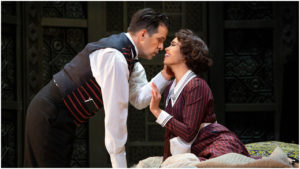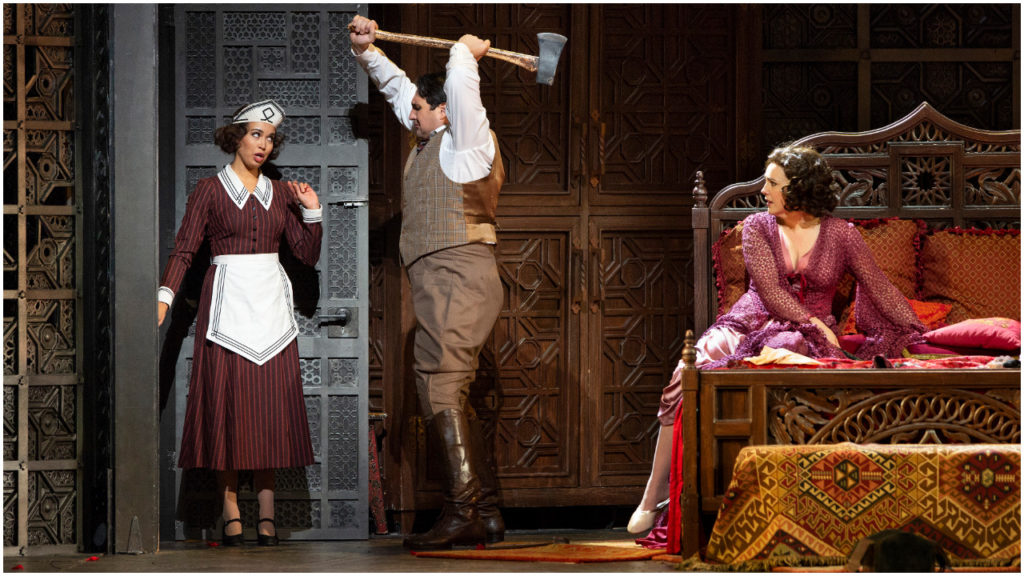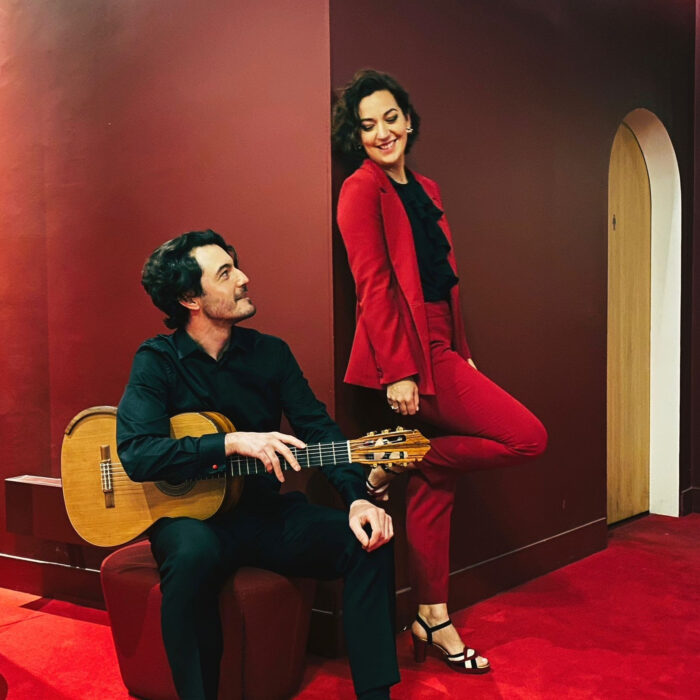
Metropolitan Opera 2019-20 Review: Le Nozze di Figaro
Cast Packs Punch with Season Premiere
By Logan Martell(Photo Credit: Marty Sohl / Met Opera)
On Nov. 16, 2019, the Metropolitan Opera premiered this season’s production of Mozart’s “Le Nozze di Figaro.” Amidst the modern set of Richard Eyre’s production, the stellar cast of artists brought no shortage of laughter while delivering a musically splendid performance. Making his conducting debut with the company was Antonello Manacorda who was able to draw much from the music while keeping the energy going strong.
Wasting little time, during the overture we see the scantily-clad Count Almaviva, with a maid dressing herself in a hurry on the way out. The stage turns and we see a sort of montage of all the preparations being made for such an eventful day, visually reinforcing the frantic grandeur coming from the orchestra.
Thanks to the dramatic and comedic sensibilities of the artists, there was hardly ever a dull moment during the performance as they flirted, fought, schemed, and scurried to stay one step ahead of each other. Recitatives between the musical numbers were handled with a quick, natural speed of delivery that did not let the charge fade before the next one, each building up into the other nicely.
Magnetic Leads
In the title role, bass-baritone Luca Pisaroni gave a highly dynamic performance; his stalwart vocality flourished through the emotional and dramatic chaos of the opera. We find his Figaro measuring the room for his new bed with his own body as Pisaroni quickly re-arranged himself, before Susanna gets his attention for their bright and charming duettinos. His countenance taking a heavier look as Susanna began to raise her concerns, Pisaroni’s repetition of Susanna’s melody to the line “I’d like to hear the rest… but I’m getting upset,” receiving a firm, drawn-out delivery. While she explained the Count’s intentions towards her, Pisaroni’s Figaro continued to assemble the bed in the middle of the room, ostensibly by ripping entire boards from the set. Though his voice and face conveyed his disbelief with his lord, that he kept at his work showed that it did not give him much pause as he transitioned to a smoldering rendition of his cavatina “Se vuol ballare.” This number was calculating but far from cold as Pisaroni fenced with a cane in hand, armed also with scornful, confident tones. These qualities returned for his Act three aria “Aprite un po’ quegli occhi,” now directed at his seemingly-unfaithful wife. Here the jaded rhythm nicely bolstered Pisaroni’s driving triplet measures as he railed against the fairer sex, shining a flashlight into the audience as he sang the phrase “See them as they are!” Few performers are as funny as Pisaroni, and performances such as Saturday’s serve as solid proof.
As Susanna, Nadine Sierra’s velvety, full-bodied soprano saw a wide breadth of expression throughout her extended time on stage. Not long after endearing the audience with her playful opening numbers, Sierra’s duettino with Elizabeth Bishop’s Marcellina, “Via resti servita,” saw the two slinging insults with a fun, sonorous flair. At times at the mercy of the unfolding events, while at others pulling the strings, Sierra’s effervescence lasted with great consistency; these latter moments were highly entertaining, with the occasional excited, mischievous cackle from Sierra to spice up her honeyed lyricism. The Act three sextet “Riconosci in questo aplesso,” was joined by Sierra’s lovely, indignant ornaments as she fumed at Figaro’s seeming betrayal, her ensuing slap coming across strong and clear. Her Act three duettino with Susanna Phillips “Che soave zeffiretto,” saw the two sopranos engage in lovely, conspiratorial harmonies. Her later aria, “Deh vieni, non tardar,” made for a magical number due to Sierra’s enchanting rendition, slowly making her way up the stairs wrapped around the tree in the middle to deliver gorgeous sustained tones.

Splendid Supporting Cast
In the role of Count Almaviva, Adam Plachetka struck a figure that was comedic while not sacrificing any of the count’s menacing qualities; this was seen earlier on after furiously emerging from his hiding spot for the trio “Cosa sento.” His firm threatening phrases meshed well with Sierra and Giuseppe Filianoti’s fearful ones, building up to a nice reveal of the hiding Cherubino. As he mused on the events of the previous two acts, the set spun around to a set dinner table, as Susanna mustered up the courage to attempt luring him to the gardens later. His anger on realizing her ploy led to a nice, fiery rendition of his aria “Hai gia vinta la causa.” As he savored getting the last laugh on his servant, Plachetka indulged in firm yet darkly-excited ornaments.
As Countess Almaviva, Susanna Phillips was elegant and deeply touching, as heard from her entrance aria “Porgi amor.” Her legato phrases ached with loving, nostalgic sentiment that rose towards a tenderly soaring height. These delicate qualities made it all the more delightful when the countess has to hide Cherubino in the closet, doing her best to try to dissuade her husband’s burning suspicions. Her disguised entrance during the finale came smoothly, not missing a beat as she readied to reveal herself. Her answer as to whether or not she forgives him, however, came after a brief pause which nicely played with what everyone knows to be a done deal.
Making her Metropolitan Opera debut was mezzo-soprano Gaëlle Arquez in the role of Cherubino. Her entrance was full of youthful zest, which carried nicely into her aria “Non so piu cosa son, cosa faccio,” as heard from her agile vocal leaps. This romantically-charged daydream saw Arquez deliver a gently-soaring cadenza before the lyrical adagio section. Here Arquez indulged in the slower tempo set by Mancorda, really fleshing out the delicate phrases while not allowing the mood to dissipate, before bringing it to a bright and excited close. Her Cherubino entered and often exited full of energy, as seen in both her hilarious jump from the window, or earlier when running offstage from the count as a nice transition to the chorus “Giovani liete, fiori spargete.” Her interactions with Phillip’s Countess, however, were full of a sensual charge that made their attraction visibly mutual, and strongly foreshadowed the characters’ future affair in Beaumarchais’ “The Guilty Mother.”
As Dr. Bartolo, Brindley Sherrat’s resonant bass saw an early showcase with his aria “La Vendetta,” deftly handling the lower plunges as well as the pattering measures of legal nomenclature. His outburst of “Coll’ astuzia!” and “Col giudizio!”, backed by the orchestra’s forte chords, humorously startled Marcellina as she tried to do her makeup. The earthy presence of his voice ensured he was not lost amidst the many strong egos of the other characters. Speaking of strong egos, Elizabeth Bishop made a delightful showing as Marcellina; her enthusiasm for stopping the wedding quickly gave way to joy after learning Figaro is her son. When asked if anyone could be happier, her bright, sustained repetition of “I am!” came as a funny, bubbly interjection.
In the role of Barbarina, Meigui Zhang displayed a clear and lovely soprano through her time onstage. Her Act four cavatina “L’ho perduta, me meschina,” saw Zhang explore the phrases with a highly-gentle touch as she repeated her way through the softly concerned phrases, building to a refined, cradling hold of the last “cosa dira?”
While “Le Nozze di Figaro” is an opera frequently performed, Saturday’s cast of artists reminds one why this is the case as they brought waves of laughter while seizing the most out of the music, making for an utterly splendid season premiere of Mozart’s timeless comedy.



